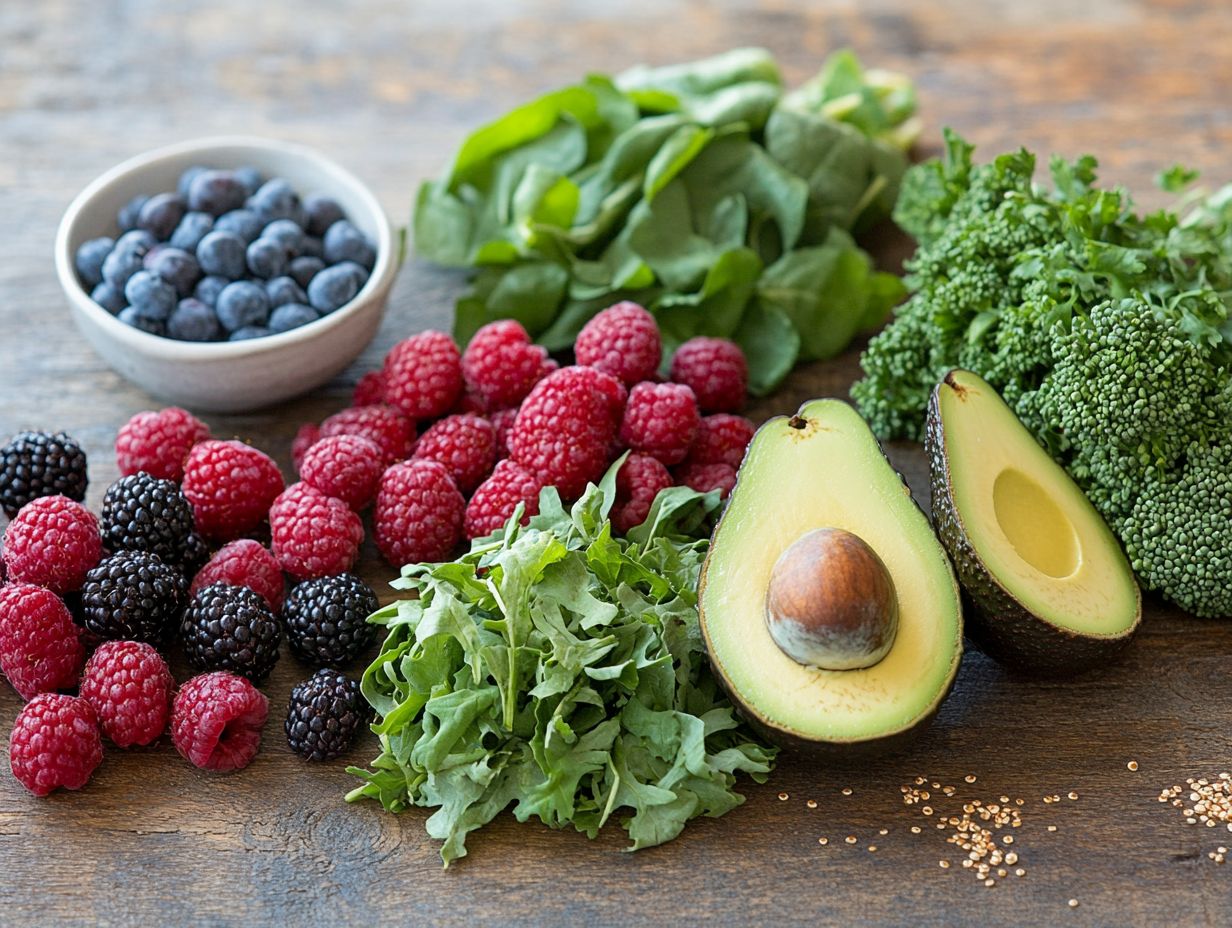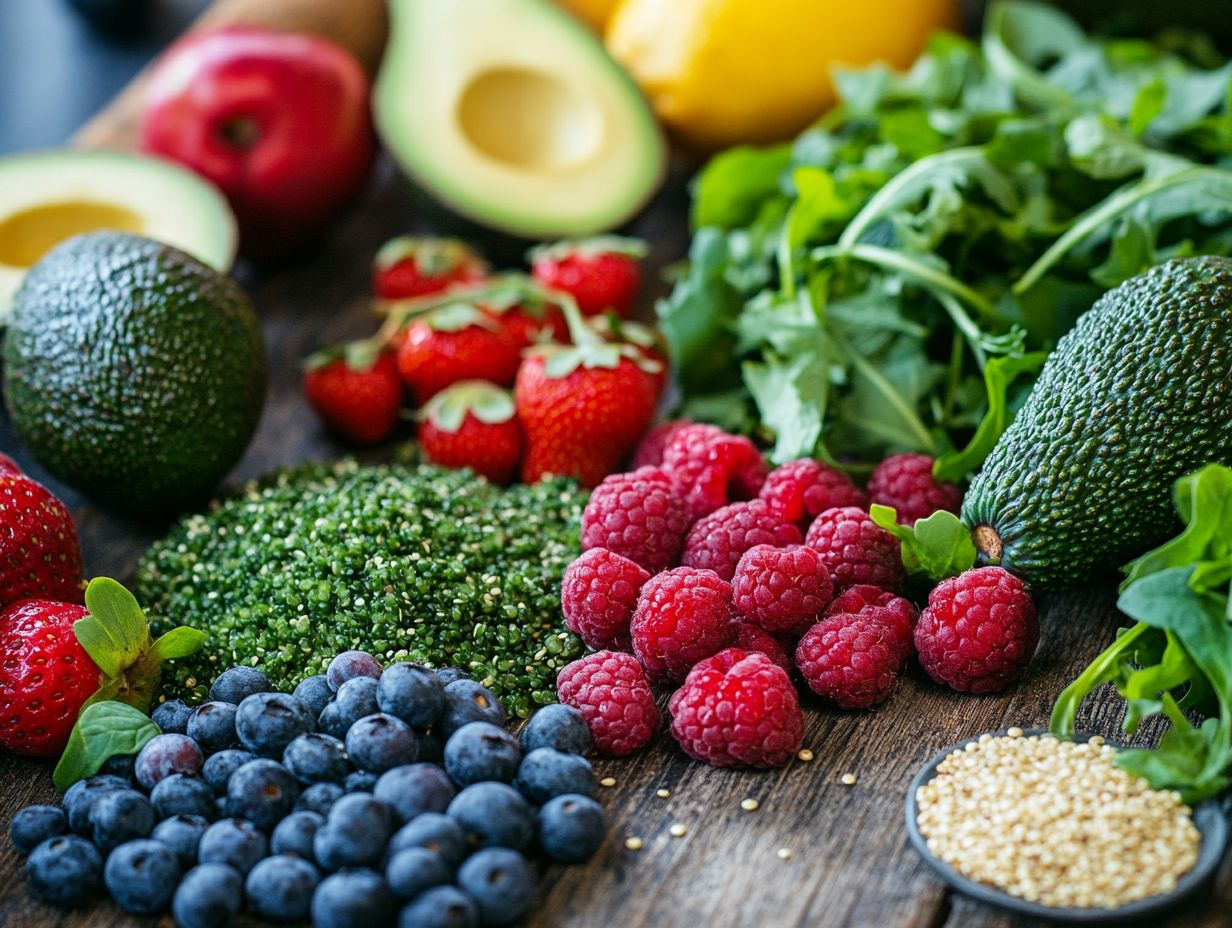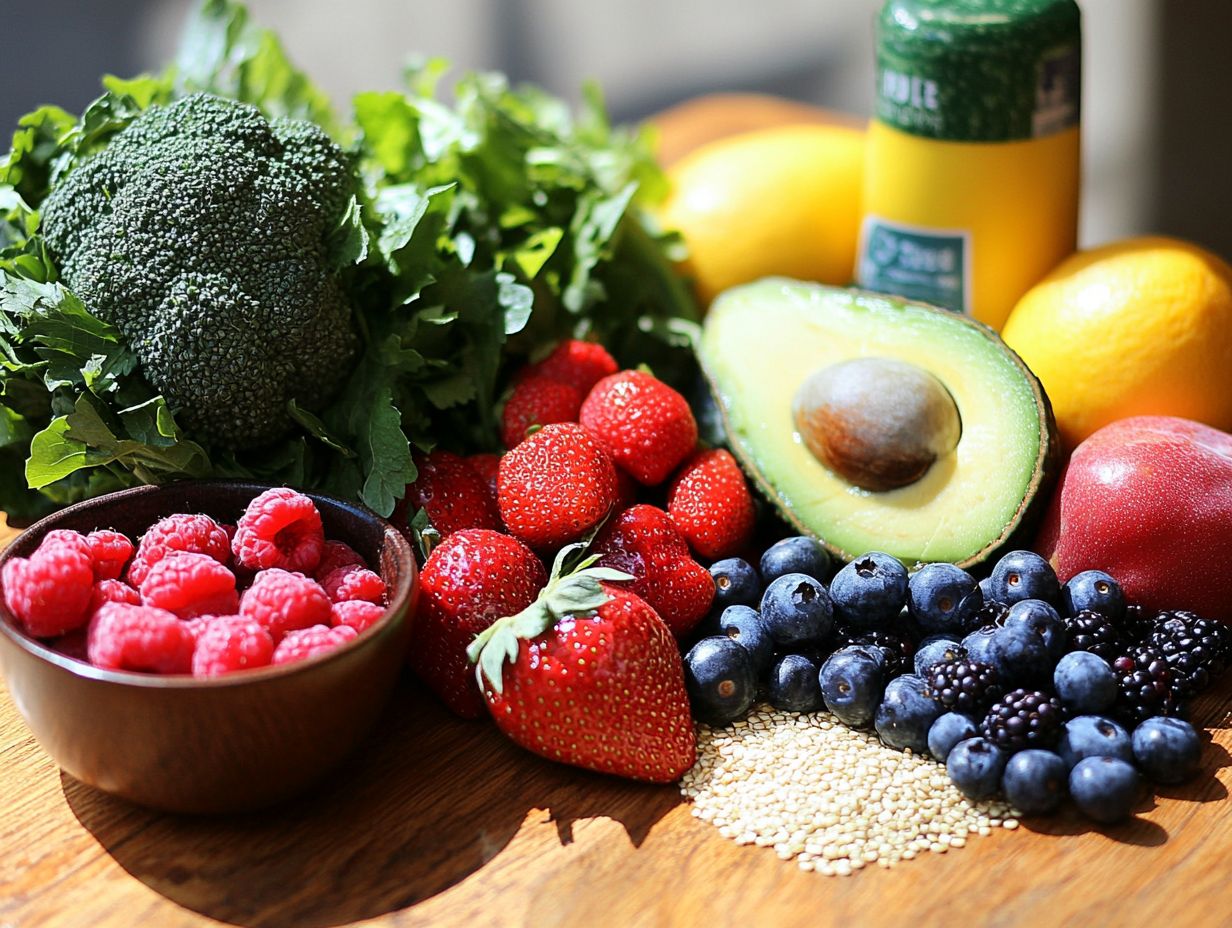8 Simple Tips to Improve Your Nutritional Intake
In today s fast-paced world, keeping a balanced diet might seem like an overwhelming challenge. However, you ll find that making small, mindful adjustments to your eating habits can profoundly enhance your overall health.
This article offers eight straightforward tips tailored to elevate your nutritional intake. It guides you from incorporating a diverse array of foods to embracing the art of mindful eating. You ll uncover the significance of choosing nutrient-dense options, learn how to limit processed foods, and explore effective methods to track your progress.
Start your journey to better health today! You ll be amazed at how achievable your wellness goals can be.
Contents
- Key Takeaways:
- 1. Eat a Variety of Foods
- 2. Include Fruits and Vegetables in Every Meal
- 3. Choose Whole Grains over Refined Grains
- 4. Limit Processed and Packaged Foods
- 5. Incorporate Lean Protein Sources
- 6. Don’t Forget About Healthy Fats
- 7. Stay Hydrated
- 8. Practice Mindful Eating
- What Is Nutritional Intake and Why Is It Important?
- How Can One Incorporate More Nutrient-Dense Foods into Their Diet?
- What Are the Potential Risks of Not Eating Well?
- What Are Some Simple Ways to Track and Monitor Nutritional Intake?
- Frequently Asked Questions
- What are 8 simple tips to improve your nutritional intake?
- Can improving my nutritional intake help prevent chronic diseases?
- Is it necessary to take supplements to improve my nutritional intake?
- How can I make sure I am getting enough protein in my diet?
- Do I need to avoid all fats to improve my nutritional intake?
- Can I still enjoy my favorite foods while trying to improve my nutritional intake?
Key Takeaways:

- Eat a variety of foods to ensure you are getting a wide range of nutrients.
- Make fruits and vegetables a staple in every meal for added vitamins, minerals, and fiber.
- Choose whole grains over refined grains to increase nutrient intake and promote satiety.
1. Eat a Variety of Foods
Embracing a variety of foods is crucial for your health. It ensures you receive a diverse array of nutrients and supports balanced eating.
Additionally, it helps you maintain a healthy weight through effective caloric management and enhanced portion control. By integrating different food groups fruits, vegetables, whole grains, lean proteins, and healthy fats you enrich your meals and bolster your body’s defenses against diseases like obesity and heart disease.
Consider incorporating a vibrant selection of fruits, such as berries and citrus. These provide essential vitamins like C and antioxidants.
Leafy greens, such as spinach and kale, are powerhouses of fiber and minerals. Whole grains like quinoa and brown rice offer vital carbohydrates for energy and support digestion.
Lean proteins found in chicken, beans, and legumes are integral for muscle repair and growth. On the other hand, healthy fats from avocados and nuts promote heart health and enhance nutrient absorption.
By thoughtfully including these diverse food groups in your diet, you can craft satisfying meals that nourish both your body and mind.
2. Include Fruits and Vegetables in Every Meal
Incorporating fruits and vegetables into every meal is essential for healthy eating. They provide vital vitamins, minerals, and a wealth of fiber that supports digestive health and overall well-being.
These vibrant foods enhance nutrient density and play a crucial role in creating a balanced diet. They offer a spectrum of plant nutrients that may help protect against chronic diseases. The array of colors and textures makes your meals more appealing and satisfying.
To effortlessly weave more fruits and vegetables into your daily meals, consider these simple strategies:
- Start your day with a delicious smoothie.
- Add a handful of spinach or kale to your omelets.
- Toss a medley of chopped vegetables into your pasta dishes.
Keeping fresh produce within easy reach encourages healthier snacking choices throughout the day.
3. Choose Whole Grains over Refined Grains
Choosing whole grains instead of refined grains is essential for maintaining a balanced diet. Whole grains provide higher fiber content and essential nutrients.
They promote a sense of fullness, which plays a role in effective portion control and healthier eating habits. This choice supports your digestive health by promoting regularity and lowers your risk of chronic diseases like heart disease, type 2 diabetes, and certain cancers.
To incorporate more whole grains into your daily meals, consider these simple suggestions:
- Start your day with a hearty bowl of oatmeal.
- Swap white rice for quinoa or brown rice at lunch.
- Experiment with whole grain breads or pasta during dinner.
These straightforward substitutions can significantly enhance your overall health.
4. Limit Processed and Packaged Foods
Limit processed foods to maintain a healthy diet. These items often have too much sugar, saturated fat, and salt, which can contribute to obesity and heart disease.
The health risks linked to high sugar intake extend beyond weight gain. They also include an increased likelihood of developing type 2 diabetes and a collection of conditions that increase heart disease risk. When indulging in too many processed options, it’s easy to overlook whole, nutrient-rich foods that truly support overall health.
To counter this, consider integrating fresh fruits and vegetables into your daily meals. Opt for whole grains instead of refined ones, and choose lean proteins over processed meats.
Being mindful of labels and selecting products with low added sugars and minimal ingredients can significantly enhance your choices. This approach paves the way for a more balanced and sustainable diet.
5. Incorporate Lean Protein Sources

Incorporating lean protein sources like fish, eggs, and Greek yogurt is crucial for building and repairing tissues. These foods boost your health and maintain muscle mass.
Lean proteins deliver high-quality nutrition. Fish is rich in omega-3 fatty acids, eggs provide essential amino acids, and Greek yogurt offers calcium and probiotics.
Emphasizing lean protein aids in weight management. Increased satiety helps curb overeating and stabilizes energy levels, enhancing your overall vitality.
6. Don’t Forget About Healthy Fats
Healthy fats, like those in fish, nuts, and avocados, are vital for a balanced diet. They lower bad cholesterol and support heart health.
These beneficial fats play a crucial role in preventing plaque buildup in arteries, ultimately reducing heart disease risk. Unlike unhealthy trans and saturated fats, healthy fats promote better circulatory health.
Incorporating foods like olive oil, chia seeds, and fatty fish such as salmon enhances your overall well-being. These choices satisfy your hunger and support essential bodily functions.
7. Stay Hydrated
Stay hydrated for optimal health. Drinking enough water supports your bodily functions, helps regulate caloric intake, and enhances overall well-being.
Aim for 8-10 cups of water a day for most adults. Individual needs may vary based on activity level, climate, and overall health. Recognize signs of dehydration, such as dry mouth, fatigue, and headaches, to make timely adjustments.
To boost your daily water consumption, consider these strategies:
- Set fun reminders on your phone to drink up!
- Keep a colorful reusable water bottle by your side.
- Add fruits like lemon or berries to your water for delicious flavor.
Remember, staying hydrated is a key step towards feeling your best every day!
8. Practice Mindful Eating
Practicing mindful eating invites you to truly listen to your hunger cues and make conscious food choices. This promotes portion control and nurtures a healthier relationship with food.
This practice encourages you to slow down during meals. You can fully appreciate the aromas and textures of each bite. By savoring flavors and engaging all your senses, you can find satisfaction in smaller portions. This reduces the temptation to overeat. Recognizing emotional triggers related to food like stress or boredom enables you to make more intentional eating decisions.
To implement mindful eating strategies, consider setting a calming ambiance for your meals. Limit distractions and take a few deep breaths before you begin. This creates a more conducive environment for enjoying food thoughtfully and enhances the overall experience.
What Is Nutritional Intake and Why Is It Important?
Nutritional intake includes the food and beverages you consume. It is essential for your body to function at its best. It plays a pivotal role in maintaining a healthy weight, supporting metabolic functions, and ensuring overall health through a well-balanced diet.
This intake includes both macronutrients, which include carbohydrates, proteins, and fats, and micronutrients, such as vitamins and minerals. Macronutrients provide energy and are vital for growth and repair, while micronutrients support various metabolic processes and bolster your immune function.
Each nutrient carries its own importance. For instance, proteins are essential for muscle development and repair; carbohydrates act as your body s primary energy source.
Neglecting proper nutritional intake can invite a range of health issues, from fatigue and a weakened immune response to chronic conditions like obesity and diabetes. This ultimately impacts your overall well-being and longevity.
Choosing a balanced diet is an exciting investment in your health!
How Can a Balanced Diet Improve Your Overall Health?

A balanced diet can profoundly enhance your overall health by lowering the risk of chronic diseases like heart disease and obesity. It also boosts your energy levels, mental clarity, and longevity.
Incorporating a diverse array of fruits, vegetables, whole grains, and lean proteins supplies essential nutrients and helps maintain a healthy weight. For example, opting for a vibrant selection of vegetables allows you to reap the benefits of antioxidants, which are vital in fighting inflammation in your body.
Choosing whole grains instead of refined options promotes better digestive health. Indulging in healthy fats from sources like avocados or nuts can bolster your cardiovascular function. By making mindful dietary choices, you can effectively reduce health risks tied to poor nutrition. This sets the stage for improved physical and mental well-being.
What Are the Most Nutrient-Dense Foods?
Nutrient-dense foods are your best allies in the quest for healthy eating, providing a wealth of nutrients relative to their calorie content. This makes them essential for making informed dietary choices.
Consider incorporating a variety of options into your meals, such as:
- leafy greens like spinach and kale,
- vibrant fruits like berries and oranges,
- fatty fish such as salmon, and
- whole grains like quinoa and brown rice.
Each of these selections is brimming with vitamins, minerals, and antioxidants that bolster your overall health. For instance, leafy greens are loaded with vitamins A, C, and K, which are crucial for immune function and bone health. Meanwhile, fatty fish deliver omega-3 fatty acids known to promote heart health.
In contrast, many calorie-dense foods lack significant nutrients and can lead to weight gain and various health issues. By prioritizing these nutrient-rich alternatives, you can not only satisfy your nutritional needs but also enhance your well-being in a meaningful way. Start making these changes today for a healthier future!
How Can One Incorporate More Nutrient-Dense Foods into Their Diet?
Incorporating more nutrient-dense foods into your diet can be achieved with a few strategic approaches, such as meal planning, cooking at home, and making mindful choices while grocery shopping.
Spend a few hours weekly planning your meals. This step helps create a balanced shopping list that highlights vibrant produce, wholesome grains, and lean proteins. For instance, whipping up dishes like quinoa salads brimming with colorful vegetables or robust lentil soups can elevate your nutritional intake.
Emphasizing the significance of home-cooked meals gives you complete control over your ingredients and sparks creativity in the kitchen. Exploring local farmers’ markets can also enhance your shopping experience, presenting you with fresh, seasonal options that boost both flavor and well-being.
What Are the Potential Risks of Not Eating Well?
Poor nutritional intake can lead to various health issues, including obesity, heart disease, and other chronic conditions, primarily driven by excessive sugar consumption and unbalanced eating habits.
Statistics indicate that nearly 40% of adults are classified as obese, increasing their risk for related ailments like type 2 diabetes and hypertension. A study by the American Heart Association highlights that poor dietary habits are responsible for about 45% of cardiovascular disease cases.
Real-world examples illustrate this issue vividly: children living in food deserts often face malnutrition, hindering their growth and academic success. Make healthier food choices a top priority for your health!
Don t wait! Start adding more fruits and vegetables to your diet today to significantly reduce these concerning health risks and set the stage for a healthier future.
What Are Some Simple Ways to Track and Monitor Nutritional Intake?
Tracking and monitoring your nutritional intake can be streamlined through various methods, allowing you to maintain a healthy weight and make informed dietary choices while promoting effective portion control.
One popular approach is utilizing food diaries or mobile apps designed for this purpose. By logging your meals and snacks, you gain valuable insights into your eating habits and can pinpoint areas needing improvement.
Understanding portion sizes is essential; it helps manage caloric intake and ensures a balanced diet rich in essential nutrients. When you recognize proper serving sizes, you ll be better equipped to enjoy a diverse range of foods without overindulgence, fostering a healthier relationship with your meals.
Frequently Asked Questions

What are 8 simple tips to improve your nutritional intake?
- Eat a variety of foods from all food groups: Including fruits, vegetables, whole grains, lean proteins, and healthy fats ensures a wide range of nutrients.
- Plan ahead and meal prep: Planning your meals and snacks for the week helps you make healthier choices and avoid last-minute fast food options.
- Stay hydrated: Drinking enough water is crucial for optimal health and can help you feel fuller to prevent overeating.
- Read nutrition labels: Pay attention to serving sizes and ingredients to make informed decisions about the foods you consume.
- Limit processed and packaged foods: These foods are often high in unhealthy fats, added sugars, and sodium, contributing to various health issues.
- Incorporate more fruits and vegetables: Aim to fill half your plate with fruits and vegetables at each meal to increase your intake of vitamins, minerals, and fiber.
- Don’t skip meals: Skipping meals can lead to overeating and make it challenging to meet your nutritional needs.
- Consult a registered dietitian: For personalized nutrition advice, consider seeking help from a registered dietitian who can assess your unique needs and provide tailored recommendations.
Can improving my nutritional intake help prevent chronic diseases?
Yes, a well-balanced diet can help prevent chronic diseases like heart disease, diabetes, and some cancers. Choose whole, minimally processed foods to give your body the nutrients it needs to thrive.
Is it necessary to take supplements to improve my nutritional intake?
It depends on your situation. If you’re lacking a specific nutrient or can’t meet your needs through food, supplements might help, but consult a healthcare professional first.
How can I make sure I am getting enough protein in my diet?
Include a variety of protein sources in your meals. Good options are lean meats, poultry, fish, eggs, beans, and legumes.
Snacks like Greek yogurt, nuts, or hummus can also boost your protein intake.
Do I need to avoid all fats to improve my nutritional intake?
No, not all fats are bad. Healthy fats from avocados, nuts, seeds, and fatty fish provide energy and support cell growth.
Cutting back on unhealthy fats keeps you feeling great!
Can I still enjoy my favorite foods while trying to improve my nutritional intake?
Absolutely! You don’t have to give up your favorite treats. Enjoy them in smaller portions and balance them with nutrient-rich options throughout your day.






